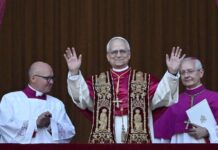 American exceptionalism seems to get a bad rap these days. After two centuries of support of the excellence of our nation, from Presidents, such as Abraham Lincoln, who alluded to American exceptionalism in his Gettysburg Address (“a new nation conceived in liberty”) down to ordinary American citizens a new generation of hand-wringing pundits and intellectuals has determined that our nation is, in fact, nothing special; they argue that we are simply a footnote in the expanse of human history, another Sparta or Troy or Rome destined to collapse under the weight of its own arrogance.
American exceptionalism seems to get a bad rap these days. After two centuries of support of the excellence of our nation, from Presidents, such as Abraham Lincoln, who alluded to American exceptionalism in his Gettysburg Address (“a new nation conceived in liberty”) down to ordinary American citizens a new generation of hand-wringing pundits and intellectuals has determined that our nation is, in fact, nothing special; they argue that we are simply a footnote in the expanse of human history, another Sparta or Troy or Rome destined to collapse under the weight of its own arrogance.
This petty squabble over distinction, however, misses the much deeper meaning of American exceptionalism. The argument takes a shortsighted approach to the issue, and in the process, warps our understanding of why we take pride in our nation. The idea of America as special comes from 19th century author Alexis de Tocqueville, who called America an “exceptional nation” in his 1835 account Democracy in America. This embodiment of early American sentiment has defined our identity from inception: America believes that, at its core, it is exceptional.
The belief that we are a special nation, apart from the rest of the world, distinct from both our European founders and our North American neighbors, is often misconstrued as a claim to superiority. American exceptionalism holds to the idea that we are cut from a different mold, shaped by different forces than the rest of the world. It does not, however, denote supremacy over the remainder of the planet. The argument over American exceptionalism overlooks the fact that we as a people held to the belief long before we held economic, political, or military clout as a nation.
For its first 150 years of existence, the United States held little sway in global affairs, politically or economically. Sure, the US held dominance on its home turf, taking their slice of the continent from Britain, Spain, France, Mexico, Russia, and Native American tribes. But on a larger scale, America was still a funny little footnote on the global picture of Western European dominance. However, it was during this time that Americans began holding themselves as different, unique, special among the nations of the world. So, if exceptional doesn’t necessarily mean better than the rest, what exactly does American exceptionalism mean?
To understand the American identity, we must first come to terms with how we changed from a group of British colonial possessions to a sovereign nation. Neither the Anglicans nor the Puritans who came to the American colonies in the 17th and 18th centuries were effective in spreading their faith in the new world. Neither faith spread strong roots in America, and as a result, religion was by and large an afterthought to most Americans after the second and third generation. Furthermore, Anglicans and Puritans primarily argued over church doctrine, creating disunity among their respective followers. This disunity hindered the establishment of a cohesive American identity.
The Great Awakening, however, pulled America out of non-belief and disunity and established the American identity we know today. The movement, which took hold of the colonies from the 1730’s through the 1760’s, initially focused on looking inside oneself for purity and righteousness. It stressed the role of moral living as the path to salvation, calling all Christian believers to live a just life. The second part of the movement deemphasized the petty disputes over church doctrine and denomination, instead stressing the Christianity of followers. George Whitefield, an itinerant preacher and central figure in the Great Awakening, argued that God has little concern as to what denomination a Christian followed; rather, He only cares if a man embraces Jesus Christ as his personal savior.
“Great Awakening” was an apt name for the movement, as it brought a newfound identity to the colonists of North America. Suddenly, Americans no longer were bound by denominational status, but rather were joined together as Christian believers. Doctrinal clashes no longer divided the colonists; Christianity now served as a cohesive force, rallying believers together under a common goal: achieving salvation through clean living and righteous deeds.
In the search for righteousness, American colonists embraced the Enlightenment idea of humanism. Humanism, under its original religious pretense, means that an integral part of worshiping God is admiring and protecting His most prized creation: humanity. To the colonists, honoring humanity meant protecting free thought and facilitating human growth. In order to fully honor humanity, colonists believed, a community must protect individuals’ God-given rights, defined by British philosopher John Locke as life, liberty, and property. Under this humanist paradigm, American colonists were awakened, so to speak, to the British encroachment on these rights through colonial law.
As American backlash against British rule grew, a fight for American independence became inevitable. The call for “natural rights,” allotted to all men by the creator, became a rallying cry in the war for independence. The Americans saw themselves not as a group of disgruntled colonists seeking a reprieve from unjust rule, but as a family of devoted believers dedicated to the rights of men. They rebelled against the systematic dehumanizing of colonists, the suppression of their inalienable rights to “life, liberty, and the pursuit of happiness” as phrased in the Declaration of Independence. The colonists were more than just a bunch of angry citizens disturbed by grievances. They believed that the British rule in the colonies directly contradicted the basic principles of righteousness, making the protection of humanity, and in it the righteous worship of God, impossible.
The American colonists’ concept of just rule embraced the freedom of thought as a basic tenant of humanity, and advocated its unequivocal protection. This meant that, while most colonists took Jesus Christ as their lord, being a righteous follower meant allowing people the freedom of thought and belief. While this belief seems paradoxical and even counterintuitive from a logical standpoint (if the goal of a believer is to draw others into their faith, then how does freedom of religion make sense?), it opened the American community to all faith followers. The Christian colonists also held to the idea that living justly meant casting out oppression. In the search for righteousness in the Great Awakening, colonists asserted that all men deserve the same rights and responsibilities, as we are all equal under God: “There is neither Jew nor Gentile, neither slave nor free, nor is there male and female, for you are all one in Christ Jesus” (Galatians 3:28). This egalitarianism, coupled with the belief in freedom of thought, means that the title “American” transcends race, faith, and nationality; all that matters is the belief in the principles of life, liberty, and the pursuit of happiness.
Now, to come full circle, the American identity formed out of the Great Awakening and the ensuing drive for independence. It is also the basis of the belief that America is unique, the basis of American exceptionalism. Unlike the other nations of the world, whose identities are defined by race or creed or rule, the American identity is defined by solidarity in conviction. The belief in the special grace of humanity, in the freedom to prosper, in the freedom to think without restriction, draws us together as a family in a way no other nation could. Later in Democracy in America, Tocqueville notices that “Americans are so enamored of equality, they would rather be equal in slavery than unequal in freedom.” And that is really what brings us together as one contemplative in action, one family.
The union inherent in the American identity, a union that embraces all creeds and colors and genders and languages, sets us apart from the world. It supports us throughout our lives and brings us into a deeper understanding of what it means to be good people. In that way, our collective identity as “American” brings us into a loving tradition, binding us as a family of believers. So this holiday season, when we thank God for the love of our families, thank Him also for the American family we are blessed to be a part of.
http://www.gradesaver.com/author/alexis-tocqueville/
http://eh.net/encyclopedia/article/Rockoff.WWI
http://people.csail.mit.edu/sfelshin/saintonge/frhist.html
http://www.nationalatlas.gov/mld/usacqup.html
http://www.wfu.edu/~matthetl/perspectives/four.html
http://www.great-awakening.com/
http://www.ccel.org/w/whitefield/
http://www.historycentral.com/revolt/causes.html
http://www.wsu.edu/~brians/hum_303/enlightenment.html
http://plato.stanford.edu/entries/locke/
http://www.biblegateway.com/passage/?search=Galatians+3%3A28&version=NIV
http://www.goodreads.com/author/quotes/465.Alexis_de_Tocqueville
http://showcase.netins.net/web/creative/lincoln/speeches/gettysburg.htm






